人教英语九年级语法汇总
人教版初三英语知识点总结

人教版初三英语知识点总结一、语法重点1. 时态- 一般现在时:表示经常发生的动作或状态。
- 一般过去时:表示过去发生的动作或状态。
- 现在进行时:表示正在进行的动作。
- 过去进行时:表示过去某一时刻正在进行的动作。
- 一般将来时:表示将来会发生的动作。
- 现在完成时:表示过去发生的动作对现在的影响或结果。
- 过去完成时:表示在过去某一动作之前已经完成的另一动作。
2. 语态- 被动语态:表示主语是动作的承受者。
- 一般现在时被动语态:am/is/are + past participle。
- 一般过去时被动语态:was/were + past participle。
- 现在进行时被动语态:am/is/are being + past participle。
- 一般将来时被动语态:will be + past participle。
3. 非谓语动词- 动名词:作为名词使用,表示动作。
- 分词:现在分词(表示正在进行)和过去分词(表示被动或完成)。
- 不定式:to + base form of verb,表示动作的目的、意图或结果。
4. 情态动词- can/could:表示能力或请求。
- may/might:表示可能性。
- must:表示必须或强烈义务。
- should/ought to:表示建议或应当。
5. 句子结构- 简单句:一个主语和一个谓语。
- 并列句:使用并列连词连接两个或多个简单句。
- 复合句:包含一个主句和至少一个从句。
- 定语从句:修饰名词或代词的从句。
- 状语从句:表示时间、地点、原因、条件、结果等。
二、词汇与短语1. 常见词汇- 描述人物特征的形容词:kind, honest, creative, etc.- 描述日常活动的动词短语:clean up, take out, turn off, etc.- 描述情感和情绪的名词:happiness, sadness, anger, etc. - 描述天气的词汇:sunny, rainy, windy, etc.2. 短语搭配- 动词短语搭配:finish doing, stop to do, remember to do, etc.- 形容词与介词的搭配:afraid of, interested in, good at, etc.- 常用口语表达:What's up?, How about…?, It's up to you, etc.三、阅读理解技巧1. 快速阅读(Skimming)- 快速浏览文章,抓住主旨大意。
人教版九年级英语知识点归纳,短语总结,语法归纳!
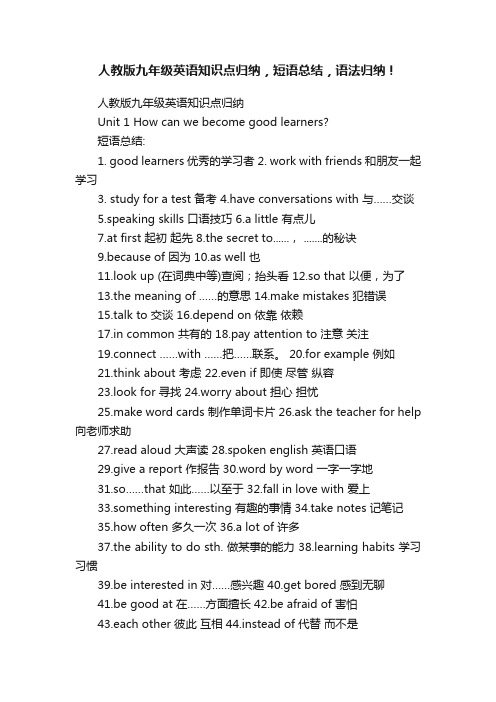
人教版九年级英语知识点归纳,短语总结,语法归纳!人教版九年级英语知识点归纳Unit 1 How can we become good learners?短语总结:1. good learners 优秀的学习者2. work with friends 和朋友一起学习3. study for a test 备考4.have conversations with 与……交谈5.speaking skills 口语技巧6.a little 有点儿7.at first 起初起先 8.the secret to......, .......的秘诀9.because of 因为 10.as well 也11.look up (在词典中等)查阅;抬头看 12.so that 以便,为了13.the meaning of ……的意思 14.make mistakes 犯错误15.talk to 交谈 16.depend on 依靠依赖17.in common 共有的 18.pay attention to 注意关注19.connect ……with ……把……联系。
20.for example 例如21.think about 考虑 22.even if 即使尽管纵容23.look for 寻找 24.worry about 担心担忧25.make word cards 制作单词卡片 26.ask the teacher for help 向老师求助27.read aloud 大声读 28.spoken english 英语口语29.give a report 作报告 30.word by word 一字一字地31.so……that 如此……以至于 32.fall in love with 爱上33.something interesting 有趣的事情 34.take notes 记笔记35.how often 多久一次 36.a lot of 许多37.the ability to do sth. 做某事的能力 38.learning habits 学习习惯39.be interested in 对……感兴趣 40.get bored 感到无聊41.be good at 在……方面擅长 42.be afraid of 害怕43.each other 彼此互相 44.instead of 代替而不是二.用法集萃1. by doing sth 通过做某事2.it +be+adj+to do sth 做某事是……的3.finish doing sth 完成某事4.what about doing sth?做某事怎么样?5.try to do sth 尽力做某事6.the +比较近,the+比较近越……,就越……7.find it+adj+to do sth 发现做某事 8.be afraid of doing sth 害怕做某事9.help sb (to) do sth 帮助某人做某事 10.practice doing sth 练习做某事11.keep doing sth 一直做某事 12.be afraid to do sth 害怕做某事13.begin to do sth 开始做某事 14.want to do sth 想要做某事15.need to do sth 需要做某事 16.remember to do sth 记得做某事17.shoot 射(射着,射死等表结果) 18.shoot at(瞄准)射Unit 2 I think that mooncakes are delicious!一.短语归纳1.put on 增加(体重)发胖2.care about 关心在乎3.end up 最终成为,最后处于4.not only ……but also……不但……而且……5.shoot down 射下ed to do 过去常常做……7.remind sb. of 使某人想起 8.give out 分发发放9.the water festival 泼水节 10.the Chinese spring festival 中国春节11.next year 明年 12.sound like 听起来像13.each other 互相彼此 14.in the shape of 以……的形状15.on mid-autumn night 在中秋之夜 16.fly up to 飞向y out 摆开布置 e back 回来19.as a result 结果因此20.mother’s day 母亲节21.more and more popular 越来越受欢迎 22.think of 想起认为思考23.dress up 装扮穿上盛装24.the importance of ……的重要性25.make money 挣钱 26.in need 需要帮助处于困境中27.between ……and…… 在……和……之间28.the dragon boat festival 龙舟节29.the lantern festival 元宵节 30.like best 最喜欢31.go to ……for a vacation 去……度假 32.be similar to 与……相似33.wash away 冲走洗掉 34.mid-autumn festival 中秋节35.shoot down 射下 36.call out 大声呼喊37.the tradition of ……的传统 38.at night 在夜里在晚上39.one……,the other……一个……,另一个… 40.Father’s day 父亲节41.have to 必须不得不 42.play a trick on sb 捉弄某人43.the spirit of ……的精神 44.care about 关心45.wake up 醒来46.the beginning of ……的开始二.用法集萃1.感叹句式一:What+(a/an)+adj+名词(+主语+谓语+其他)!多么……的……感叹句式二:How +adj/adv+主语+谓语+其他!……多么……!2.in+时间段在……后3.give sb. sth. 给某人某物4.plan to do sth 计划做某事5.refuse to do sth 拒绝做某事6.one of +名词复数形式……之一7.it +is+名词+动词不定式(to do sth)做某事是…8.what …think of…?认为…怎么样?9.make sb do sth 让某人做某事 ed to be 过去是……11.warn sb(not) to do sth告诫某人做某事 12.tell sb(not)to do sth 告诉某人做某事13.decide to do sth 决定做某事 14.promise to do sth 承诺、答应做某事三.语法全解1.宾语从句一.连词a.陈述语序(that)b.一般疑问句(if 或whether)c.特殊疑问句(5w,1h)二.陈述语序三.时态可跟that从句做宾语的动词:say, think, insist, wish, hope, demand, imagine, wonder, know, see, believe, agree, admit, deny, expect, explain, order, command, feel, dream, suggest, hear, mean, notice, prefer, request, require, propose, declare, report等例:I don’t know what they are looking for.Could you tell me when the train will leave?注意:当主句谓语动词是 think, believe, suppose, expect 等词,而宾语从句的意思是否定时,常把否定转移至主句表示。
人教版九年级英语知识点归纳

人教版九年级英语知识点归纳一、语法知识点1. 一般现在时:用于描述经常发生的行为或真相,动词原形加s/es。
2. 一般过去时:用于描述过去发生的动作或状态,动词过去式形式。
3. 现在进行时:用于描述当前正在进行的动作,be动词+动词ing形式。
4. 现在完成时:用于描述过去发生的动作对现在造成的影响,have/has + 过去分词。
5. 一般将来时:用于描述将来的动作,will/shall + 动词原形。
6. 情态动词:can, could, may, might, must, shall, should, will, would等,用于表达能力、可能性、推测、必要性等。
7. 定语从句:用于对名词进行修饰和限制,引导词有关系代词和关系副词。
8. 倒装句:用于强调句子中的某一部分,将助动词或情态动词放在主语之前。
9. 被动语态:用于强调动作的承受者,be动词+过去分词。
10. 状语从句:用于修饰句子中的动作或状态,引导词有时间、原因、条件等。
二、词汇知识点1. 动词短语:由动词和副词、介词构成的短语,如give up,look after, think of等。
2. 同义词和反义词:指意义相同或相反的词语,如happy和glad、buy和sell等。
3. 词汇拓展:指根据前缀、后缀或词形变化,拓展词汇的能力。
4. 高频词汇:指经常出现在九年级英语课本和考试中的单词,如important, improve, knowledge等。
5. 词义辨析:指对意义相近但用法不同的词进行区分,如listen和hear、borrow和lend等。
三、阅读技巧1. 主旨大意:通过阅读文章的首句、末句和段落标题等,找出文章的主题或中心思想。
2. 查找信息:通过快速阅读或扫读,找出与特定问题或关键词相关的信息。
3. 推理判断:根据文章中的暗示或细节推断出未写明的信息或作者的观点。
4. 阅读策略:如预测题目、通读全文、找关键词等,帮助提高阅读效率和准确性。
九年级英语三单元语法

九年级英语三单元语法一、人教版九年级英语第三单元语法:被动语态(一般现在时、一般过去时、含有情态动词的被动语态)1. 一般现在时的被动语态。
- 构成:am/is/are+过去分词。
- 例句。
- English is spoken all over the world.(全世界都讲英语。
)在这个句子中,“English”是动作“speak”的承受者,主语“English”是单数第三人称,所以be动词用“is”,“speak”的过去分词是“spoken”。
- These books are sold in that bookstore.(这些书在那家书店出售。
)“books”是复数,所以be动词用“are”,“sell”的过去分词是“sold”。
2. 一般过去时的被动语态。
- 构成:was/were+过去分词。
- 例句。
- The bridge was built last year.(这座桥是去年建造的。
)“bridge”是单数,时态是一般过去时,所以be动词用“was”,“build”的过去分词是“built”。
- These cars were made in China.(这些汽车是中国制造的。
)“cars”是复数,所以be动词用“were”,“make”的过去分词是“made”。
3. 含有情态动词的被动语态。
- 构成:情态动词+be+过去分词。
- 例句。
- The work should be done today.(这项工作应该今天完成。
)“should”是情态动词,后面接“be”,“do”的过去分词是“done”。
- The trees can be planted in spring.(这些树可以在春天种植。
)“can”是情态动词,后面接“be”,“plant”的过去分词是“planted”。
初三(九年级)英语语法大全
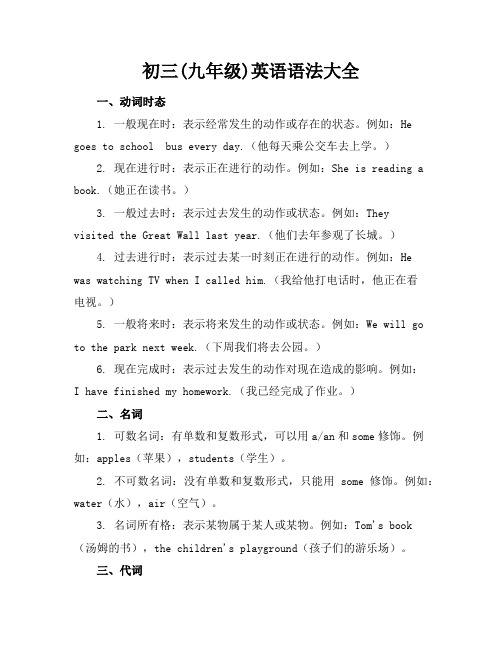
初三(九年级)英语语法大全一、动词时态1. 一般现在时:表示经常发生的动作或存在的状态。
例如:He goes to school bus every day.(他每天乘公交车去上学。
)2. 现在进行时:表示正在进行的动作。
例如:She is reading a book.(她正在读书。
)3. 一般过去时:表示过去发生的动作或状态。
例如:Theyvisited the Great Wall last year.(他们去年参观了长城。
)4. 过去进行时:表示过去某一时刻正在进行的动作。
例如:He was watching TV when I called him.(我给他打电话时,他正在看电视。
)5. 一般将来时:表示将来发生的动作或状态。
例如:We will go to the park next week.(下周我们将去公园。
)6. 现在完成时:表示过去发生的动作对现在造成的影响。
例如:I have finished my homework.(我已经完成了作业。
)二、名词1. 可数名词:有单数和复数形式,可以用a/an和some修饰。
例如:apples(苹果),students(学生)。
2. 不可数名词:没有单数和复数形式,只能用some修饰。
例如:water(水),air(空气)。
3. 名词所有格:表示某物属于某人或某物。
例如:Tom's book(汤姆的书),the children's playground(孩子们的游乐场)。
三、代词1. 人称代词:I(我),you(你/你们),he(他),she(她),it(它),we(我们),they(他们)。
2. 物主代词:my(我的),your(你的/你们的),his(他的),her(她的),its(它的),our(我们的),their(他们的)。
3. 指示代词:this(这个),that(那个),these(这些),those(那些)。
人教版九年级英语重点知识梳理词汇_短语句型语法

九年级英语知识点Unit 1I、重点短语:1.lisen to tapes 听录音2. ask the teacher for help 向老师请求帮助3. read aloud 朗读4. speaking skills 口头表达能力5.spoken English英语口语6. end up 结束ter on 以后,随后8. make mistakes 犯错,出错ugh at嘲笑,取笑10.take notes 做笔记,做记录11.look …up (在词典、参考书等中)查阅,查找12. make up 编造,组成13.deal / do with 处理,应付14.be angry with生……的气15.go by (指时间)过去,消逝16.try one’s best to do sth. 尽力做……17.break off 突然中止,中断18. with the help of 在……的帮助下19.regard…as…把……当做……20.be afraid of doing / to do sth 害怕做某事21. first of all 首先,开始22. have trouble / a difficult / hard time doing sth.做某事有困难II、重点句型:1.It’s too hard to understand the voices. 理解那些话有困难。
(It’s too ...to ....)2. How do you study for a test? I study by listening to tapes.我通过听磁带学习。
(by )3. Studying grammar is a great way to learn a language.(动名词做主语谓语用单数)4.I was afraid to speak in class. 我害怕在课堂上说话。
人教版九年级英语Unit 11语法总结

人教版九年级英语Unit 11语法总结1. 一般将来时(Simple Future Tense)- 表示将要发生的动作或存在的状态。
- 结构:主语 + will + 动词原形。
- 示例:- I will go to the party tomorrow.- She will help me with my homework.2. 现在进行时(Present Continuous Tense)- 表示现在正在进行的动作。
- 结构:主语 + am/is/are + 现在分词。
- 示例:- We are watching a movie right now.- They are playing football in the park.3. 现在完成时(Present Perfect Tense)- 表示过去发生的动作对现在有影响或结果。
- 结构:主语 + have/has + 过去分词。
- 示例:- I have finished my homework.- She has visited Paris.4. 过去时(Simple Past Tense)- 表示过去发生的动作或存在的状态。
- 结构:主语 + 动词过去式。
- 示例:- He studied English last night.- They visited their grandparents during the summer vacation.5. 动词不定式(Infinitive)- 用于表示目的、愿望、打算等。
- 结构:to + 动词原形。
- 示例:- She plans to travel around the world.- 用于比较两个或多个事物的大小、程度、数量等。
- 示例:- He is taller than his brother.- This is the most delicious cake I have ever had.7. 疑问句(Question Sentences)- 用于询问信息、意见、建议等。
人教版九年级英语知识点总结
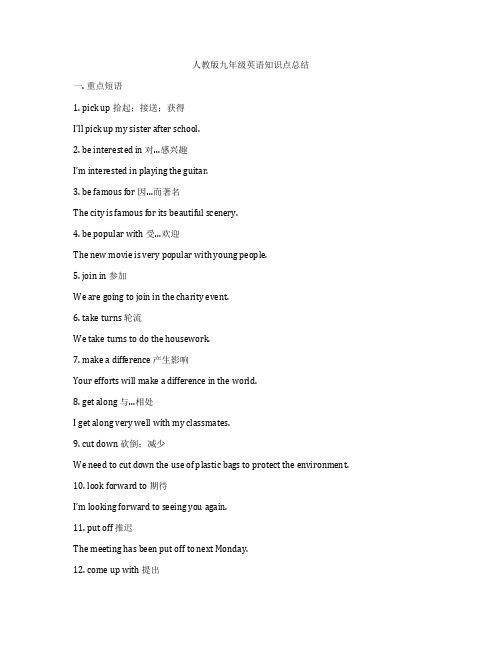
人教版九年级英语知识点总结一. 重点短语1. pick up 拾起;接送;获得I’ll pick up my sister after school.2. be interested in 对…感兴趣I’m interested in playing the guitar.3. be famous for 因…而著名The city is famous for its beautiful scenery.4. be popular with 受…欢迎The new movie is very popular with young people.5. join in 参加We are going to join in the charity event.6. take turns 轮流We take turns to do the housework.7. make a difference 产生影响Your efforts will make a difference in the world.8. get along 与…相处I get along very well with my classmates.9. cut down 砍倒;减少We need to cut down the use of plastic bags to protect the environment.10. look forward to 期待I’m looking forward to seeing you again.11. put off 推迟The meeting has been put off to next Monday.12. come up with 提出We need to come up with a plan for the project. 13. keep in touch 保持联系We keep in touch by sending emails.14. make up 编造;弥补She made up a story about why she was late.15. run out of 用完We have run out of milk and need to buy some more.二. 重点语法1. 一般现在时肯定句:主语 + V原 + 其他He plays football every weekend.否定句:主语 + do not/does not + V原 + 其他I do not like watching horror movies.疑问句:Do/Does + 主语 + V原 + 其他Do they enjoy playing basketball?2. 一般过去时肯定句:主语 + V-ed/Vt + 其他She visited Beijing last year.否定句:主语 + did not + V原 + 其他We did not go to the concert last night.疑问句:Did + 主语 + V原 + 其他Did you finish your homework yesterday?3. 现在进行时肯定句:主语 + am/is/are + V-ing + 其他She is watching TV now.否定句:主语 + am/is/are + not + V-ing + 其他He is not playing football at the moment.疑问句:Am/Is/Are + 主语 + V-ing + 其他Are you studying for the exam?4. 一般将来时肯定句:主语 + will + V原 + 其他She will travel to Japan next month.否定句:主语 + will not + V原 + 其他I will not forget to call you.疑问句:Will + 主语 + V原 + 其他Will he come to the party?5. 现在完成时肯定句:主语 + have/has + V过去分词 + 其他They have finished their homework.否定句:主语 + have/has + not + V过去分词 + 其他We have not seen this movie yet.疑问句:Have/Has + 主语 + V过去分词 + 其他Have you ever been to Paris?6. 被动语态肯定句:主语 + am/is/are + V过去分词 + 其他The book is written by my favorite author.否定句:主语 + am/is/are + not + V过去分词 + 其他The dishes are not washed by my brother.疑问句:Am/Is/Are + 主语 + V过去分词 + 其他Is the car fixed by the mechanic?三. 重点词汇1. 人物teacher 老师student 学生doctor 医生nurse 护士engineer 工程师pilot 飞行员musician 音乐家actor 演员writer 作家scientist 科学家athlete 运动员2. 动作run 跑步jump 跳跃swim 游泳dance 跳舞sing 唱歌play 演奏climb 爬山cook 烹饪paint 绘画ride 骑行3. 环境house 房子school 学校hospital 医院office 办公室library 图书馆park 公园beach 海滩mountain 山river 河lake 湖四. 重点句型1. 八大情态动词can 能够I can speak English fluently.could 过去能够She could play the piano when she was five. may 可能May I go to the restroom, please?might 可能It might rain this afternoon.must 必须You must finish your homework before 8pm. shall 将要Shall we go to the movies tonight?should 应该You should study for the exam tomorrow.will 将要We will visit the Great Wall next week.2. 祈使句Be quiet! 安静!Don’t be late! 别迟到!Sit down, please. 请坐下。
人教版英语九年级语法知识点

1. by + doing 通过……方式如:by studying with a groupby 还可以表示:"在…旁","靠近","在…期间"、"用,""经过","乘车"等如:I live by the river. I have to go back by ten o'clock.The thief entered the room by the window.The student went to park by bus.2. talk about 谈论,议论,讨论如:The students often talk about movie after class. 学生们常常在课后讨论电影。
talk to sb. === talk with sb. 与某人说话3. 提建议的句子:①What/ how about +doing sth. 如:What/ How about going shopping②Why don't you + do sth. 如:Why don't you go shopping③Why not + do sth. 如:Why not go shopping④Let's + do sth. 如: Let's go shopping⑤Shall we/ I + do sth. 如:Shall we/ I go shopping4. a lot 许多常用于句末如:I eat a lot. 我吃了许多。
5. too…to 太…而不能常用的句型 too+adj./adv. + to do sth.如:I'm too tired to say anything. 我太累了,什么都不想说。
6. aloud, loud与loudly的用法三个词都与"大声"或"响亮"有关。
人教版初中英语九年级全册各单元知识点、语法归纳整理
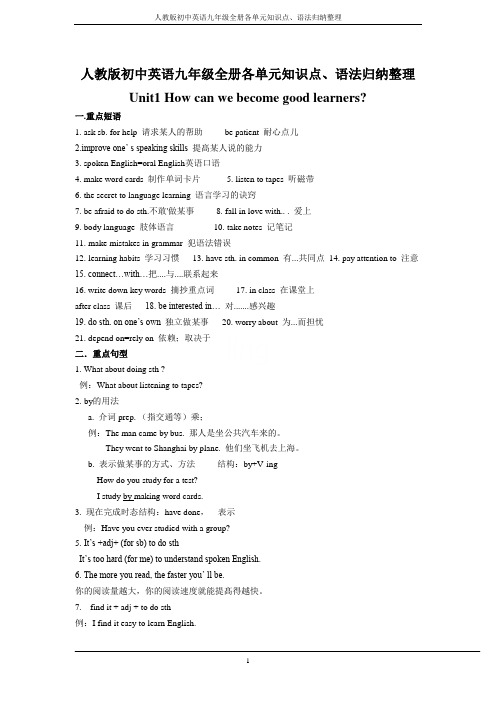
人教版初中英语九年级全册各单元知识点、语法归纳整理Unit1 How can we become good learners?一.重点短语1. ask sb. for help 请求某人的帮助be patient 耐心点儿2.improve one’ s speaking skills 提髙某人说的能力3. spoken English=oral English英语口语4. make word cards 制作单词卡片5. listen to tapes 听磁带6. the secret to language learning 语言学习的诀窍7. be afraid to do sth.不敢'做某事8. fall in love with.. . 爱上9. body language 肢体语言10. take notes 记笔记11.make mistakes in grammar 犯语法错误12.learning habits 学习习惯13. have sth. in common 有...共同点14. pay attention to 注意15. connect…with…把....与....联系起来16. write down key words 摘抄重点词17. in class 在课堂上after class 课后18. be interested in… 对.......感兴趣19. do sth. on one’s own 独立做某事20. worry about 为...而担忧21. depend on=rely on 依赖;取决于二.重点句型1. What about doing sth ?例:What about listening to tapes?2.by的用法a. 介词 prep. (指交通等)乘;例:The man came by bus. 那人是坐公共汽车来的。
人教版英语九年级各单元语法梳理
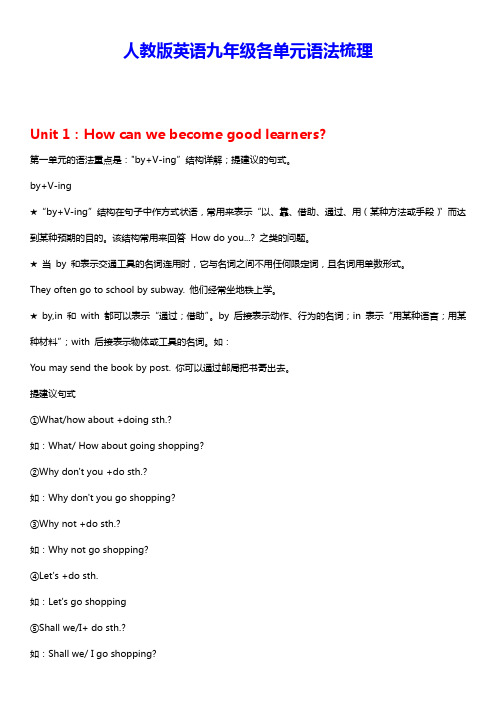
反义疑问句
①肯定陈述句+否定提问。如:
Lily is a student isn't she?
Lily will go to China,won't she?
②否定陈述句+肯定提问。如:
She doesn't come from China,does she?
You haven't finished homework,have you?
3. take 后面常跟双宾语,常见用法有以下几种:
① It takes sb.+时间+to do sth. 做某事花了某人多少时间。
② doing sth.takes sb.+时间,做某事花了某人多少时间。
如:
① It took them three years to build this road.他们用了三年时间修完了这条路。
You may send the book by post. 你可以通过邮局把书寄出去。
提建议句式
①What/how about +doing sth.?
如:What/ How about going shopping?
②Why don't you +do sth.?
如:Why don't you go shopping?
如:
① I pay 10 yuan for the book. 我花了 10 元买这本书。
② I have to pay for the book lost. 我不得不赔丢失的书款。
③ Don't wory! I'll pay for you. 别担心,我会给你付钱的。
人教版九年级全一册英语Unit12单元语法知识点总结
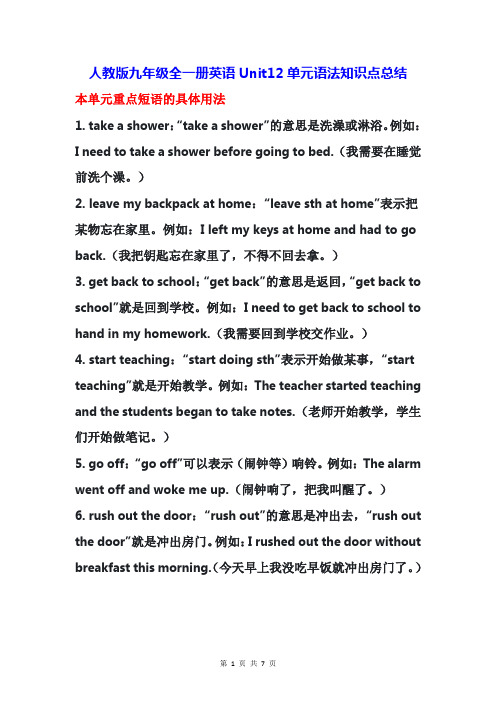
人教版九年级全一册英语Unit12单元语法知识点总结本单元重点短语的具体用法1. take a shower:“take a shower”的意思是洗澡或淋浴。
例如:I need to take a shower before going to bed.(我需要在睡觉前洗个澡。
)2. leave my backpack at home:“leave sth at home”表示把某物忘在家里。
例如:I left my keys at home and had to go back.(我把钥匙忘在家里了,不得不回去拿。
)3. get back to school:“get back”的意思是返回,“get back to school”就是回到学校。
例如:I need to get back to school to hand in my homework.(我需要回到学校交作业。
)4. start teaching:“start doing sth”表示开始做某事,“start teaching”就是开始教学。
例如:The teacher started teaching and the students began to take notes.(老师开始教学,学生们开始做笔记。
)5. go off:“go off”可以表示(闹钟等)响铃。
例如:The alarm went off and woke me up.(闹钟响了,把我叫醒了。
)6. rush out the door:“rush out”的意思是冲出去,“rush out the door”就是冲出房门。
例如:I rushed out the door without breakfast this morning.(今天早上我没吃早饭就冲出房门了。
)7. give sb a lift:“give sb a lift”的意思是让某人搭车、捎某人一程。
英语九年级全一册语法.doc
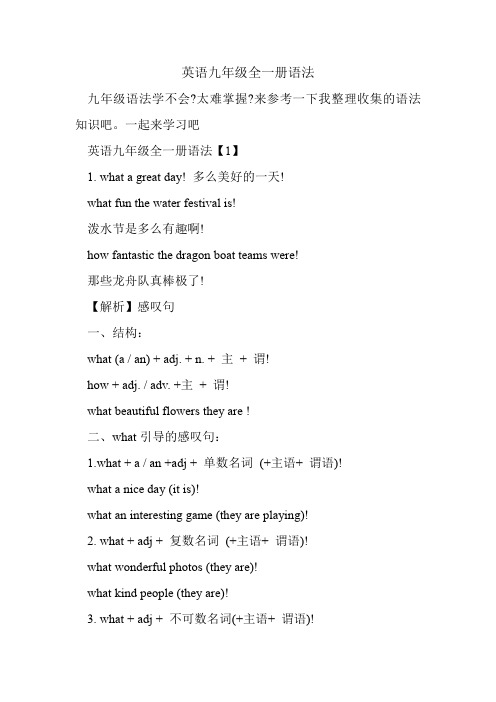
英语九年级全一册语法九年级语法学不会?太难掌握?来参考一下我整理收集的语法知识吧。
一起来学习吧英语九年级全一册语法【1】1. what a great day! 多么美好的一天!what fun the water festival is!泼水节是多么有趣啊!how fantastic the dragon boat teams were!那些龙舟队真棒极了!【解析】感叹句一、结构:what (a / an) + adj. + n. + 主+ 谓!how + adj. / adv. +主+ 谓!what beautiful flowers they are !二、what引导的感叹句:1.what + a / an +adj + 单数名词(+主语+ 谓语)!what a nice day (it is)!what an interesting game (they are playing)!2. what + adj + 复数名词(+主语+ 谓语)!what wonderful photos (they are)!what kind people (they are)!3. what + adj + 不可数名词(+主语+ 谓语)!_______ bad weather (it is)!what nice food (he cooks)!三、how引导的感叹句:1.how + adj / adv + 主语+ 谓语!how nice he is!how beautiful the flowers are!2.how + adj + a / an + 单数名词(+主语+ 谓语)!how tall a boy (he is )!how nice a song (she is singing)!3.how + adj / adv + the + 名词+ 谓语!how tall the boy is!how fine the day is!4、what 与how引导的感叹句之间的转换:1.what a beautiful girl she is != ______ beautiful the girl is !2.how delicious the food is != ______ delicious food it is !2.the dragon boat festival in hong kong 香港龙舟节【解析】介词in表地点in用于较大的地点前,如大城市、国家、洲等。
人教版初中英语九年级全册语法知识点汇总.docx
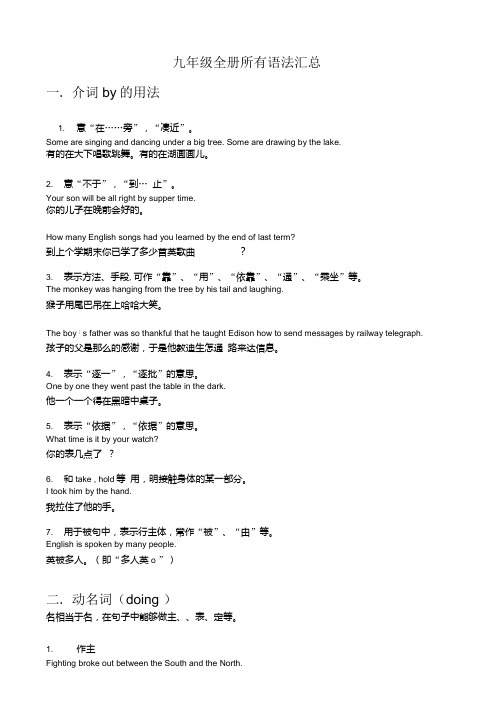
九年级全册所有语法汇总一. 介词by的用法1. 意“在……旁”,“凑近”。
Some are singing and dancing under a big tree. Some are drawing by the lake.有的在大下唱歌跳舞。
有的在湖画画儿。
2. 意“不于”,“到… 止”。
Your son will be all right by supper time.你的儿子在晚前会好的。
How many English songs had you learned by the end of last term?到上个学期末你已学了多少首英歌曲?3. 表示方法、手段,可作“靠”、“用”、“依靠”、“通”、“乘坐”等。
The monkey was hanging from the tree by his tail and laughing.猴子用尾巴吊在上哈哈大笑。
The boy ; s father was so thankful that he taught Edison how to send messages by railway telegraph. 孩子的父是那么的感谢,于是他教迪生怎通路来达信息。
4. 表示“逐一”,“逐批”的意思。
One by one they went past the table in the dark.他一个一个得在黑暗中桌子。
5. 表示“依据”,“依据”的意思。
What time is it by your watch?你的表几点了?6. 和take , hold等用,明接触身体的某一部分。
I took him by the hand.我拉住了他的手。
7. 用于被句中,表示行主体,常作“被”、“由”等。
English is spoken by many people.英被多人。
(即“多人英o ”)二. 动名词(doing )名相当于名,在句子中能够做主、、表、定等。
人教版初中英语九年级全册各单元知识点、语法归纳整理
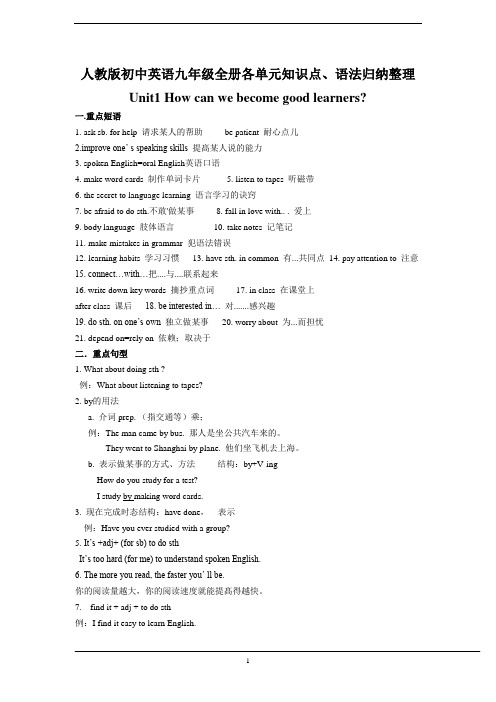
人教版初中英语九年级全册各单元知识点、语法归纳整理Unit1 How can we become good learners?一.重点短语1. ask sb. for help 请求某人的帮助be patient 耐心点儿2.improve one’ s speaking skills 提髙某人说的能力3. spoken English=oral English英语口语4. make word cards 制作单词卡片5. listen to tapes 听磁带6. the secret to language learning 语言学习的诀窍7. be afraid to do sth.不敢'做某事8. fall in love with.. . 爱上9. body language 肢体语言10. take notes 记笔记11.make mistakes in grammar 犯语法错误12.learning habits 学习习惯13. have sth. in common 有...共同点14. pay attention to 注意15. connect…with…把....与....联系起来16. write down key words 摘抄重点词17. in class 在课堂上after class 课后18. be interested in… 对.......感兴趣19. do sth. on one’s own 独立做某事20. worry about 为...而担忧21. depend on=rely on 依赖;取决于二.重点句型1. What about doing sth ?例:What about listening to tapes?2.by的用法a. 介词 prep. (指交通等)乘;例:The man came by bus. 那人是坐公共汽车来的。
人教版英语九年级语法归纳

人教版英语九年级语法归纳定语从句- 定语从句用来修饰一个名词或代词,引导定语从句的词有关系代词(如 who, whom, whose, which, that)和关系副词(如 when, where, why)。
关系代词(如 who, whom, whose, which, that)和关系副词(如 when, where, why)。
- 关系代词在定语从句中可以充当主语、宾语或定语。
- 关系副词在定语从句中可以修饰整个句子或充当成分。
- 定语从句的引导词可以省略,被修饰的名词或代词在定语从句中充当主语或宾语。
名词性从句- 名词性从句是在句中充当名词的从句。
常见的名词性从句包括主语从句、宾语从句、表语从句和同位语从句。
- 主语从句在句中充当主语,宾语从句在句中充当宾语。
- 表语从句在句中充当表语,用来说明主语或宾语的状态或性质。
- 同位语从句与前面的名词具有同样的成分,用来解释、说明或扩充这个名词的内容。
状语从句- 状语从句是充当句子中的状语,用来表示时间、地点、条件、原因、方式、目的等情况。
- 常见的连词引导状语从句的有:when, while, as, since, because, although, unless, until, if等。
- 状语从句可位于句首、句中或句尾,它与主句之间用逗号或连词连接。
比较级和最高级- 当我们要进行两者之间的比较,可以使用比较级。
- 比较级的构成:形容词和副词的比较级在词尾加-er;多音节和部分两音节形容词和副词可以在前面加more。
- 最高级用于三个或三个以上事物的比较,表示最高级程度。
- 最高级的构成:形容词和副词的最高级在词尾加-est;多音节和部分两音节形容词和副词可以在前面加most。
完成时态和被动语态- 完成时态表示在过去某个时间之前发生的动作或状态。
- 完成时态的构成:have/has + 过去分词。
- 被动语态用于强调动作的承受者,将动作的执行者放在句子后面,用by引导。
人教版初中英语九年级全册语法知识点

⑥当wh-和how引导的宾语从句与that引导的宾语从句作并列宾语从句时。
感叹句
感叹句是用来表示惊奇、愤怒、赞赏、喜悦等强烈感情的句子。句末常用感叹号“!”,一般读降调。感叹句主要用what和how引起。
1)what引导的感叹句
what引导感叹句的结构为:
Unit 2 I think that mooncakes are delicious!
Objectiveclause withthat, ifandwhether宾语从句
Exclamatory statement感叹句how & what
宾语从句
在句中起宾语作用的从句叫做宾语从句,可以分为三类:动词的宾语从句、介词的宾语从句和形容词的宾语从句。
2.不及物动词+介词(其后需加宾语)
look for寻找care for喜欢,关心get over克服
3.及物动词+副词(其后需加宾语)
send up发射,发送think over仔细考虑try on试穿
如果宾语是人称代词应将其放在动词和副词之间;如果是名词,则既可以放在动词和副词之间,也可以放在副词之后。
⑤当宾语从句是双宾语中的直接宾语或有it作形式宾语时。
⑥当wh-和how引导的宾语从句与that引导的宾语从句作并列宾语从句时。
Unit 4 I used to be afraid of the dark
Usedto过去常常
◉动词词组——Used to do sth(习惯于做某事)
Unit 5 What are the shirtsmade of?
3.介词的宾语从句
(1)一般情况下介词后面只能接wh-类连接词引导的宾语从句。
人教版九年级语法总结
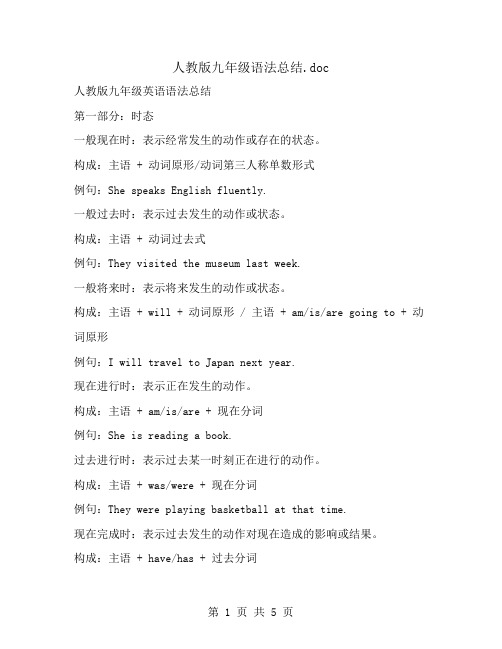
人教版九年级语法总结.doc人教版九年级英语语法总结第一部分:时态一般现在时:表示经常发生的动作或存在的状态。
构成:主语 + 动词原形/动词第三人称单数形式例句:She speaks English fluently.一般过去时:表示过去发生的动作或状态。
构成:主语 + 动词过去式例句:They visited the museum last week.一般将来时:表示将来发生的动作或状态。
构成:主语 + will + 动词原形 / 主语 + am/is/are going to + 动词原形例句:I will travel to Japan next year.现在进行时:表示正在发生的动作。
构成:主语 + am/is/are + 现在分词例句:She is reading a book.过去进行时:表示过去某一时刻正在进行的动作。
构成:主语 + was/were + 现在分词例句:They were playing basketball at that time.现在完成时:表示过去发生的动作对现在造成的影响或结果。
构成:主语 + have/has + 过去分词例句:I have finished my homework.过去完成时:表示过去的过去完成的动作。
构成:主语 + had + 过去分词例句:She had finished her homework before I called her. 将来进行时:表示将来某一时刻正在进行的动作。
构成:主语 + will be + 现在分词例句:He will be studying at that time.将来完成时:表示将来某一时间之前完成的动作。
构成:主语 + will have + 过去分词例句:We will have finished the project by next month. 第二部分:被动语态一般现在时被动语态:am/is/are + 过去分词例句:The letter is written by him.一般过去时被动语态:was/were + 过去分词例句:The house was built in 2010.一般将来时被动语态:will be + 过去分词例句:A new school will be built next year.现在完成时被动语态:have/has been + 过去分词例句:The problem has been solved.其他时态的被动语态:相应时态的构成+过去分词例句:The book was being read by her when I entered.第三部分:非谓语动词动名词:动词+ing,用作主语、宾语等。
人教九年级全册英语语法考点总结,中考必备知识点

人教九年级英语语法考点总结,中考必备知识点一. 介词by的用法1. 意为“在……旁”,“靠近”。
Some are singing and dancing under a big tree. Some are drawing by the lake.有的在大树下唱歌跳舞。
有的在湖边画画儿。
2. 意为“不迟于”,“到……时为止”。
Your son will be all right by supper time.你的儿子在晚饭前会好的。
How many English songs had you learned by the end of last term?到上个学期末你们已经学了多少首英语歌曲?3. 表示方法、手段,可译作“靠”、“用”、“凭借”、“通过”、“乘坐”等。
The monkey was hanging from the tree by his tail and laughing.猴子用尾巴吊在树上哈哈大笑。
The boy’s father was so thankful that he taught Edison how to send messages by railway telegraph. 孩子的父亲是那么的感激,于是他教爱迪生怎样通过铁路电报来传达信息。
4. 表示“逐个”,“逐批”的意思。
One by one they went past the table in the dark.他们一个一个得在黑暗中经过这张桌子。
5. 表示“根据”,“按照”的意思。
What time is it by your watch?你的表几点了?6. 和take , hold等动词连用,说明接触身体的某一部分。
I took him by the hand.我拉住了他的手。
7. 用于被动句中,表示行为主体,常译作“被”、“由”等。
English is spoken by many people.英语被许多人说。
人教版九年级全一册各单元的重点短语及语法知识点汇总
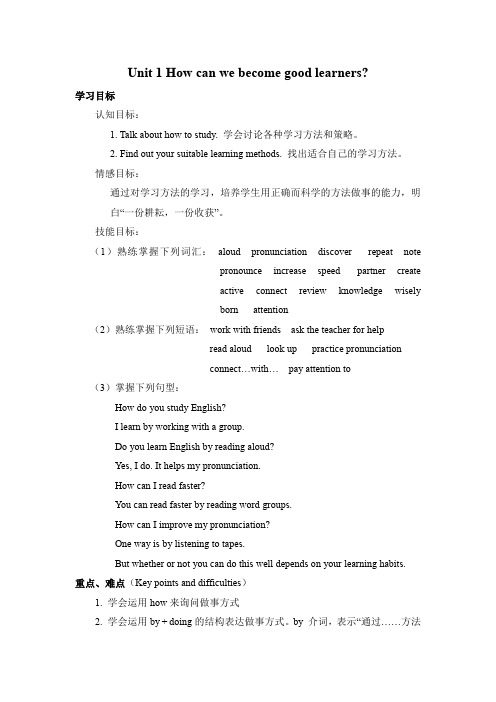
Unit 1 How can we become good learners?学习目标认知目标:1. Talk about how to study. 学会讨论各种学习方法和策略。
2. Find out your suitable learning methods. 找出适合自己的学习方法。
情感目标:通过对学习方法的学习,培养学生用正确而科学的方法做事的能力,明白“一份耕耘,一份收获”。
技能目标:(1)熟练掌握下列词汇:aloud pronunciation discover repeat notepronounce increase speed partner createactive connect review knowledge wiselyborn attention(2)熟练掌握下列短语:work with friends ask the teacher for helpread aloud look up practice pronunciationconnect…with… pay attention to (3)掌握下列句型:How do you study English?I learn by working with a group.Do you learn English by reading aloud?Yes, I do. It helps my pronunciation.How can I read faster?You can read faster by reading word groups.How can I improve my pronunciation?One way is by listening to tapes.But whether or not you can do this well depends on your learning habits.重点、难点(Key points and difficulties)1. 学会运用how来询问做事方式2. 学会运用by + doing的结构表达做事方式。
- 1、下载文档前请自行甄别文档内容的完整性,平台不提供额外的编辑、内容补充、找答案等附加服务。
- 2、"仅部分预览"的文档,不可在线预览部分如存在完整性等问题,可反馈申请退款(可完整预览的文档不适用该条件!)。
- 3、如文档侵犯您的权益,请联系客服反馈,我们会尽快为您处理(人工客服工作时间:9:00-18:30)。
新目标九年级英语语法总结 Unit11. by + doing 通过……方式 如:by studying with a groupby 还可以表示:"在…旁","靠近","在…期间"、"用,""经过","乘车"等 如:I live by the river. I have to go back by ten o'clock.The thief entered the room by the window.The student went to park by bus.2. talk about 谈论,议论,讨论如:The students often talk about movie after class. 学生们常常在课后讨论电影。
talk to sb. === talk with sb. 与某人说话3. 提建议的句子:①What/ how about +doing sth.? 如:What/ How about going shopping?②Why don't you + do sth.? 如:Why don't you go shopping?③Why not + do sth. ? 如:Why not go shopping?④Let's + do sth. 如: Let's go shopping⑤Shall we/ I + do sth.? 如:Shall we/ I go shopping?a lot 许多常用于句末如:I eat a lot. 我吃了许多。
4.5.too…to 太…而不能常用的句型 too+adj./adv. + to do sth.如:I'm too tired to say anything. 我太累了,什么都不想说。
6. aloud, loud与loudly的用法三个词都与"大声"或"响亮"有关。
①aloud是副词,重点在出声能让人听见,但声音不一定很大,常用在读书或说话上。
通常放在动词之后。
aloud没有比较级形式。
如: He read the story aloud to his son.他朗读那篇故事给他儿子听。
②loud可作形容词或副词。
用作副词时,常与speak, talk,laugh等动词连用,多用于比较级,须放在动词之后。
如:She told us to speak a little louder. 她让我们说大声一点。
③loudly是副词,与loud同义,有时两者可替换使用,但往往含有令人讨厌或打扰别人的意思,可位于动词之前或之后。
如: He does not talk loudly or laugh loudly in public. 他不当众大声谈笑。
7. not …at all 一点也不根本不如:I like milk very much. I don't like coffee at all.我非常喜欢牛奶。
我一点也不喜欢咖啡。
not经常可以和助动词结合在一起,at all 则放在句尾8. be / get excited about sth.=== be / get excited about doing sth.=== be excited to do sth. 对…感兴奋如:I am / get excited about going to Beijing.===I am excited to go to Beijing. 我对去北京感到兴奋。
9. ① end up doing sth 终止做某事,结束做某事如:The party ended up singing. 晚会以唱歌而结束。
② end up with sth. 以…结束如:The party ended up with her singing. 晚会以她的歌唱而告终。
10. first of all 首先. to begin with 一开始 later on 后来、随11. also 也、而且(用于肯定句)常在句子的中间either 也(用于否定句)常在句末 too 也 (用于肯定句) 常在句末12. make mistakes 犯错如:I often make mistakes. 我经常犯错。
make a mistake 犯一个错误如:I have made a mistake. 我已经犯了一个错误。
13. laugh at sb. 笑话;取笑(某人)如:Don't laugh at me!不要取笑我!14. take notes 做笔记,做记录15. enjoy doing sth . 喜欢做…乐意做… She enjoys playing football.她喜欢踢足球。
enjoy oneself 过得愉快如:He enjoyed himself. 他过得愉快。
16. native speaker 说本族语的人17. make up 组成、构成18. one of +(the+ 形容词比较级)+名词复数形式 …其中之一如: She is one of the most popular teachers. 她是最受欢迎的教师之一。
19. It's +形容词+(for sb. ) to do sth. (对于某人来说)做某事…如:It's difficult (for me ) to study English. 对于我来说学习英语太难了。
句中的it 是形式主语,真正的主语是to study English20. practice doing 练习做某事如:She often practice speaking English. 她经常练习说英语。
21. decide to do sth. 决定做某事如:LiLei has decided to go to BeiJing . 李雷已经决定去北京。
22. unless 假如不,除非引导条件状语从句如:You will fail unless you work hard..假如你不努力你会失败。
I won't write unless he writes first. 除非他先写要不我不写23. deal with 处理如:I dealt with a lot of problem.24. worry about sb./ sth. 担心某人/ 某事如:Mother worried about his son just now. 妈妈刚才担心他的儿子。
25. be angry with sb. 对某人生气如:I was angry with her. 我对她生气。
26. perhaps === maybe 也许27. go by (时间) 过去如: Two years went by. 两年过去了。
28. see sb. / sth. doing 看见某人正在做某事强调正在发生see sb. / sth. do 看见某人在做某事如:如: She saw him drawing a picture in the classroom.她看见他正在教室里画画。
29. each other 彼此30. regard… as … 把…看作为…. 如:The boys regarded Anna as a fool. 这些男孩把安娜看成傻瓜。
31. too many 许多 修饰可数名词 如:too many girlstoo much 许多 修饰不可数名词如:too much milkmuch too 太 修饰形容词如:much too beautiful32. change… into… 将…变为… 如:The magician changed the pen into a book. 这个魔术师将这本书变为一本书。
33. with the help of sb. == with one's help 在某人的帮助下如:with the help of LiLei == with LiLei's help 在李雷的帮助下34. pare … to … 把…与…相比 如:pare you to Anna, you are lucky.你和安娜相比,你是幸运的。
35. instead 代替 用在句末,副词(字面上常不译出来)instead of sth. / doing sth. 代替,而不是用在句中,动词如:Last summer I went to Beijing. This year I'm going to Shanghai instead.去年夏天我去北京, 今年我将要去上海。
I will go instead of you. 我将代替你去。
He stayed at home instead of going swimming. 他呆在家里而不是去游泳。
新目标九年级英语语法总结 Unit21. used to do sth. 过去常常做某事 否定形式: didn't use to do sth. / used not to do sth.如:He used to play football after school. 放学后他过去常常踢足球。
Did he use to play football? Yes, I did. No, I didn't.He didn't use to smoke. 他过去不吸烟。
2. 反意疑问句 ①肯定陈述句+否定提问 如:Lily is a student, isn't she?Lily will go to China, won't she? ②否定陈述句+肯定提问如:She doesn't e from China, does she?You haven't finished homework, have you? ③提问部分用代词而不用名词Lily is a student, isn't she? ④陈述句中含有否定意义的词,如:little, few, never, nothing, hardly等。
其反意疑问句用肯定式。
如:He knows little English, does he? 他一点也不懂英语,不是吗?They hardly understood it, did they?他们几乎不明白,不是吗?3. play the piano 弹钢琴4. ①be interested in sth. 对…感兴趣②be interested in doing sth. 对做…感兴趣如:He is interested in math, but he isn't interested in speaking English. 他对数学感兴趣,但是他对说英语不感兴趣。
